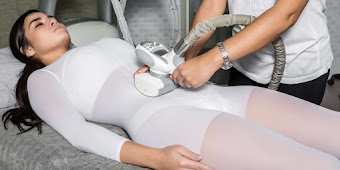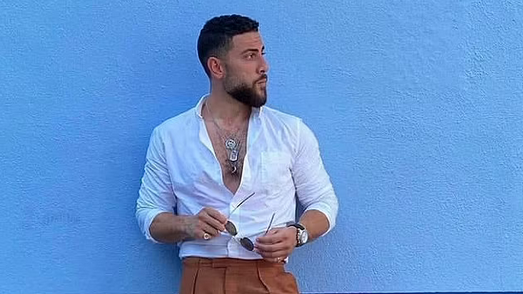Does
Coolsculpting get rid of visceral fat? No. Visceral fat doesn’t respond to
CoolSculpting because it’s below the abdominal muscles in the abdominal cavity
and wouldn’t be attracted to the applicator.
If
you’re able to pinch the fat that’s just under the skin, that means you have
subcutaneous fat (subcutaneous fat). Visceral fat stores deeper than typical
belly fat.
What is CoolSculpting?
CoolSculping
is a type of fat reduction that uses freezing temperatures to get rid of fat
cells. It's FDA-approved and works by vacuuming the skin above the fatty tissue
with an applicator.
The
cold temperatures numbed the area, and some people even felt a cooling
sensation. It usually takes around 35-60 minutes to get the job done, and
there's no downtime since there's no damage to your skin or tissue.
On
average, the fat cells will be gone in around 4-6 months. People who do
CoolSculpt report some soreness, like they might after a tough workout or a
minor muscle injury.
Other
things to watch out for are stinging and firmness, as well as mild
discoloration and swelling.
How much does CoolSculpting cost?
CoolSculpting
typically costs between $2,000 and $4,000.
RELATED: How Do I Increase My Testosterone Level At The Age Of 65?
Smaller
applicator areas like the chin and jaw can cost anywhere from $700 to $900.
According
to the American Society of Plastic Surgeons 2020 statistics report, the average
cost of a non-invasive fat reduction procedure nationwide was $1,437
last year.
The
cost will depend on how many treatments you need and the areas you want to
treat. The larger the area, the higher the cost.
It’s
also wise for you to consider how many treatments you’ll need.
If
you have more fat in certain areas, you’ll likely need more treatments.
Since
CoolSculpting isn’t a cosmetic procedure that treats a health condition,
insurance typically won’t cover the cost.
Does CoolSculpting work?
Cryolipolysis
and CoolSculpting both have a high success rate and a high level of customer satisfaction.
CoolSculpting
works for Subcutaneous fat. Subcutaneous fat is a layer of fatty tissue that
sits between the dermis (the outer layer of the skin) and the fascia (the skin
beneath the dermis).
RELATED: What Kind Of Coffee Is The Most Healthy?
Side effects and complications of CoolSculpting
Since cryoplastic surgery does not require incisions, anesthesia, or medications that can cause allergic reactions, the risk of complications and adverse reactions is much lower than with other invasive procedures, including liposuction.
Other
complications may include:
- Bruising
- Sensitivity
- Localized pain
- Swelling
- Redness
Subcutaneous vs. Visceral fat
If
you have a big, round belly, it’s likely that you have visceral fat.
Unfortunately, visceral fat is not one of the types of body fat that can be
removed with CoolSculpt.
Visceral
fat, also known as belly fat, poses serious health risks and increases your
risk of diabetes, stroke, and heart and artery diseases. It’s the fat that
surrounds the major organs.
RELATED: Which Fruit Is Not Good For The Liver?
Subcutaneous
fat, on the other hand, is a type of fat that can be safely removed from your
body with a non-invasive, non-surgical treatment.
It
lies just beneath the skin's surface. Subcutaneous fats can also accumulate in
the stomach.
How to Remove Visceral fat
The
best way to reduce visceral fat is to live a healthy lifestyle. The same diet
and exercise routine you use to lose weight and reduce total body fat can be
used to reduce visceral fat.
Here
are some ways to remove visceral fat:
Eat a healthy diet: A healthy diet consists of lean protein,
whole grain, low-fat dairy, fruit, and vegetables.
Avoid
trans fats, processed foods, refined sugars, and sodium. A low-carb diet like
the keto diet can help you lose visceral fat by teaching your body how to burn
fat for energy instead of carbs.
Good sleep hygiene: Sleep. Lack of sleep can lead to additional
visceral fat. Try to get at least 7 hours of sleep per night.
Limit
your alcohol intake: Excessive alcohol consumption can lead to an increase in
visceral fat storage.
RELATED: At what age does the aging process speed up?
Intermittent fasting: In intermittent fasting, you go through
periods of time when you eat and time when you don’t eat. It may help you lose
weight by reducing your visceral fat.
Exercise: You should aim for a minimum of 30 minutes of exercise each
day. Cardio or strength training can be part of your routine. High-intensity
interval training is one of the most popular workouts.
High-intensity
interval training workouts consist of short bursts of intense activity followed
by a quick recovery period.
High-intensity
interval training combines resistance training with aerobic training to help
burn fat faster.
Frequently Asked Questions: Does Coolsculpting Get Rid Of
Visceral Fat
What is the fastest way to get rid of visceral fat?
Through
exercising, losing weight, diet, etc.
Will CoolSculpting get rid of lower belly fat?
CoolSculpting
is a non-surgical procedure that can significantly reduce stubborn fat deposits
in the lower abdomen, resulting in a smoother, slimmer, and more
natural-looking appearance.
What eats visceral fat?
A
low-carb diet is a great way to lose visceral fat. Many studies have shown that
a low-carb diet reduces visceral fat more than a low-fat diet.
RELATED: How Do You Prepare A Pelvic Floor For Pregnancy?
What exercise burns the most visceral fat?
Cardio
or aerobic exercise
How does visceral fat leave the body?
The
fat that becomes water is then incorporated into your bloodstream until it is
lost in the form of urine, tears, perspiration, and other bodily fluids.
Can liposuction get visceral fat?
Liposuction
causes visceral fat to contract in response to physical activity: a randomized,
controlled study.
Why is my stomach bigger after CoolSculpting?
This
is a result of edema or cell swelling
Does CoolSculpting reduce waist size?
Yes.
CoolSculpting can help you get a slimmer waist.
Does Coolsculpting get rid of visceral fat?
No. CoolSculpting won't reduce visceral fat







